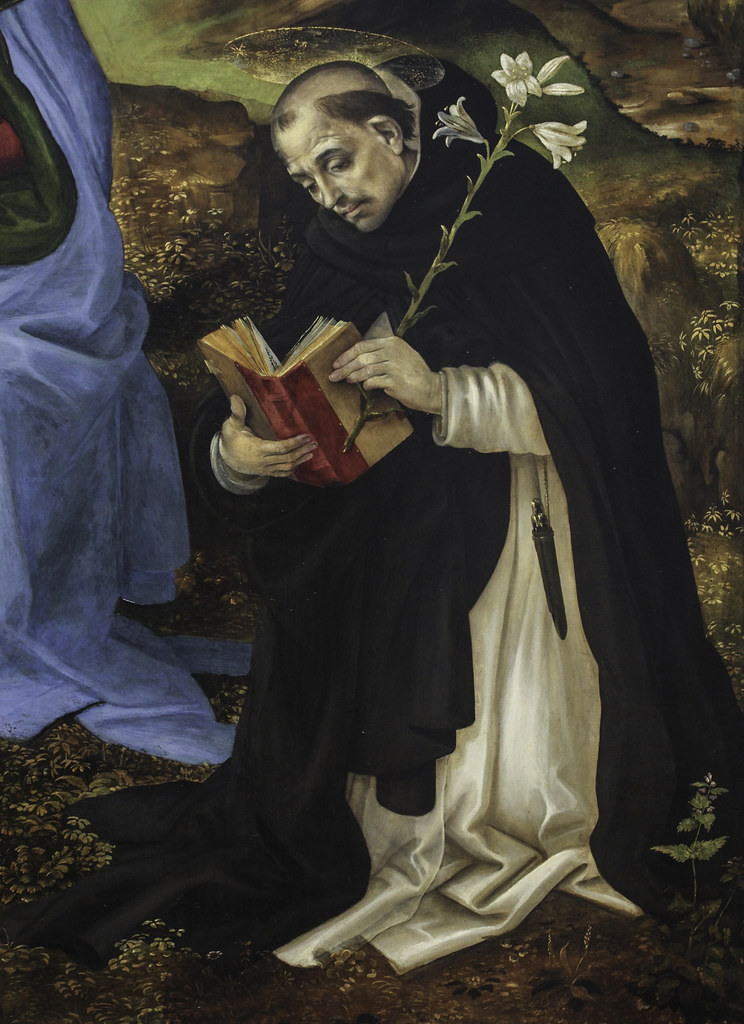Our readings last week for the 'Aquinas on Virtue' postgraduate seminar covered, in addition to the cardinal virtue of justice, the theological virtue of charity. Charity, or 'love,' for Aquinas, is a very precise notion and one that is repeated by our contemporaries in a very imprecise way. One such example, which I'd like to explore, is the Lutheran worship jingle God is Love, Love is God, sometimes heard in Catholic circles.
Here we'll sidestep the obvious English grammatical error that is switching the subject ("God") and the predicate ("love") and focus, instead, on how 'love' is understood by Aquinas, and to situate it within the famous Biblical passage "God is love" (1 Jn 4:8).
In the Thomistic framework, "love" is understood in four ways, which already renders the phrase "Love is God" ambiguous.
First, within the concupiscible appetite in the soul's sensitive power, there is the passion of love in S.th., 1a 2ae, q. 26, art. 2, sed contra, where it is described as an appetency for good. This passion of love is threefold: love for self, which aids in self-preservation; in sentient creatures, love is an appetite for sensory things which are desirable; among humans, there is also an appetite for what the intellect perceives as good. In the last case, the passion is extended to the will, and it is here where Aquinas locates what has been the classical definition of love: To will the good of another (S.th., 1a 2ae, q. 26, art. 4, respondeo).
The passion of love is part of that framework of romatic love. More on that in a bit.
Second, there is the theological virtue of charity which is defined, strictly, as a created supernatural habit in the soul's rational appetite (or the 'will') by which the Christian befriends God. Aquinas explains--
Accordingly, since there is a communication between man and God, inasmuch as He communicates His happiness to us, some kind of friendship must needs be based on this same communication, of which it is written (1 Cor. 1:9): "God is faithful: by Whom you are called unto the fellowship of His Son." The love which is based on this communication, is charity: wherefore it is evident that charity is the friendship of man for God (S.th., 2a 2ae, q. 23, art. 1).Note that the passion of love is natural and that the virtue of love is supernatural. What we often miss in English is that Aquinas assigns amor, amoris to the 'passion' of love but caritas, caritatis for the 'theological virtue' of love. Both are created; the former is naturally-occuring and the latter is supernaturally-occuring. It is for this reason that when reading 1 Corinthians 13 at wedding ceremonies, "love" must be understood in a precise way: The passion of love is not spoken here, but the theological virtue thereof. The legitimacy of reading this Pauline 'love chapter' is found in the ecclesial significance of Christian marriage and the sense of romantic love between Christian nuptials being 'elevated' to agape as per Benedict XVI's encyclical Deus caritas est (cf. n. 10).
Third, there is the hypostasis or the person of the Holy Spirit who is rightly named "Love" and "Gift." In S.th., q. 37, art. 1, respondeo, Aquinas explains--
The name Love in God can be taken essentially and personally. If taken personally it is the proper name of the Holy Ghost; as Word is the proper name of the Son.
To see this we must know that since as shown above (Question [27], Articles [2],3,4,5), there are two processions in God, one by way of the intellect, which is the procession of the Word, and another by way of the will, which is the procession of Love.Here, Aquinas appropriates St Augustine's 'verisimilitude' of the Trinity as Lover--Beloved--Loving, the Holy Spirit being the "loving" between the Father and the Son and the will within the Godhead, just as the Son is the intellect.
Fourth and finally, we have "love" under the rubric of 1 John 4:8, which Aquinas discusses at length in S.th., 1a, q. 20, art. 1. The real problem, however, is whether "love" can be the essence of the Godhead; Aquinas, being in the tradition of Pseudo-Denys, uncompromisingly teaches the ineffability and unknowability of God's quiddity with absolutely one exception: God's essence is his existence. Since will is necessarily predicated of God, it inded follows that Deus caritas est, but by no means in the sense that love is the "stuff" or the res of Divine substance.
At the same time, "love" that is predicated of God is neither a passion (as in #1 above) because passions do not exist in God: "He loves without passion" (S.th., 1a, q. 20, art. 1, ad 1; cf S.c.G., bk. I, ch. 89), since the passions are inherent in the human soul. Nor is this "love" within God a theological virtue, because its particular modality is proper, again to the human soul which, again God does not have. Nor can we reduce the triune Godhead to the Person of the Holy Spirit, since the Holy Spirit as "love" and "God" as love differ as the immanent to the economic, respectively: God always loved the Son, and that loving is the Holy Spirit; since God knows all things by knowing himself, he thus loves all things according to the modality of divine knowledge (cf. S.th., 1a, q. 14). Thus, to treat "God" and "love" as a tautology on the basis of 1 John 4:8 would be to reduce the substance of God to his love for all things according to the mode of the Divine knowlege, in which case his "ordering" of love would be so different that there would no longer be a Trinity.
So, not only is the phraseology "Love is God" grammatically erroneous, it also mistakenly assumes that the copula est means we can tautologize "God" and "love" and overlooks that "love" is understood in several senses by Aquinas--to say nothing of the Greek "four loves."






